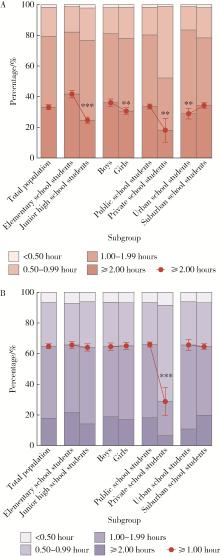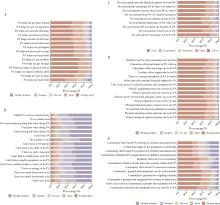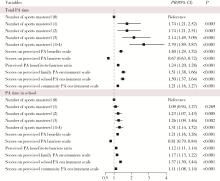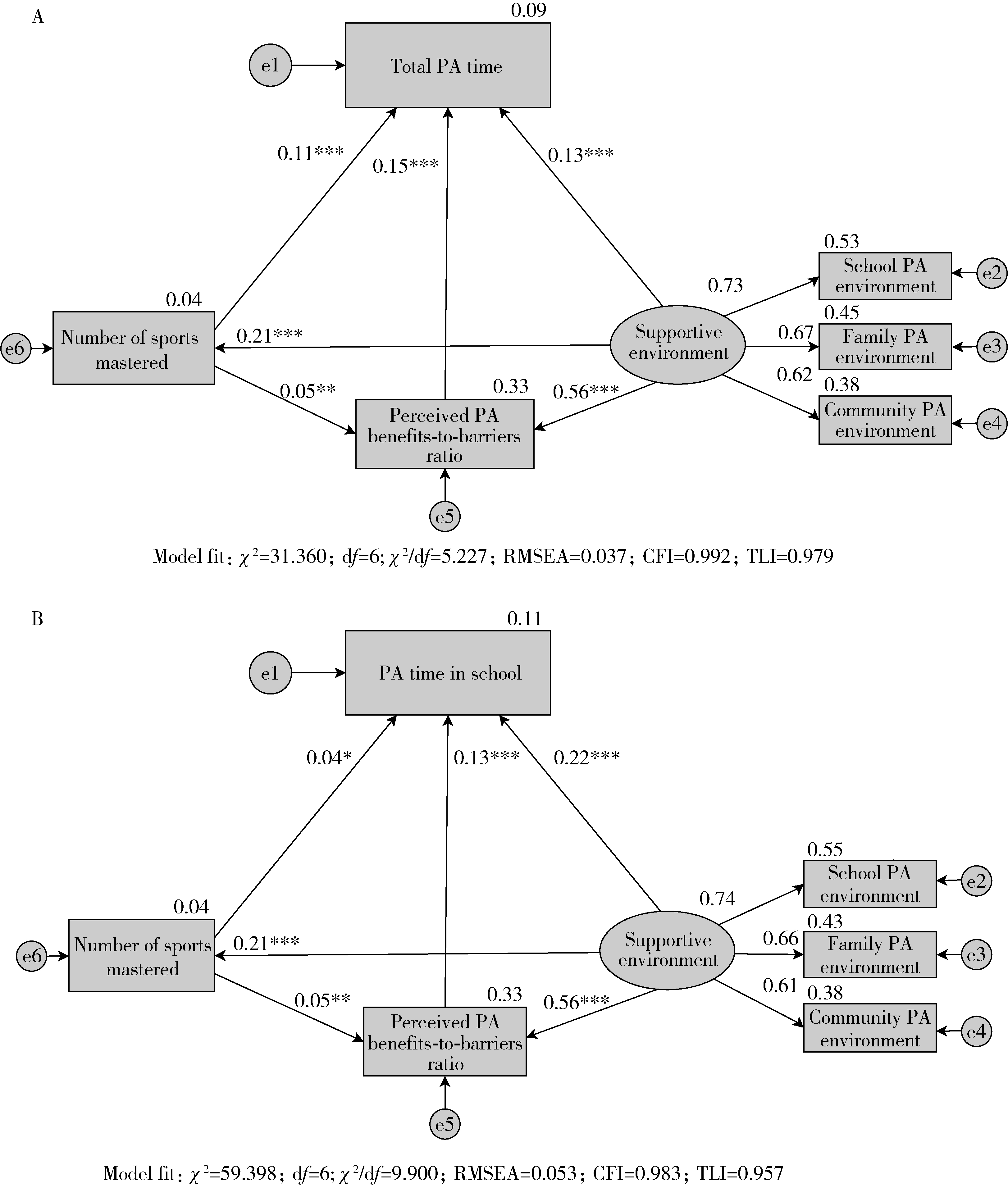Journal of Peking University (Health Sciences) ›› 2024, Vol. 56 ›› Issue (3): 403-410. doi: 10.19723/j.issn.1671-167X.2024.03.005
Previous Articles Next Articles
Status and pathways of factors influencing physical activity time among elementary and junior high school students in Beijing
Shan CAI,Yihang ZHANG,Ziyue CHEN,Yunfe LIU,Jiajia DANG,Di SHI,Jiaxin LI,Tianyu HUANG,Jun MA,Yi SONG*( )
)
- Institute of Child and Adolescent Health, Peking University School of Public Health, Beijing 100191, China
CLC Number:
- R179
| 1 |
Kohl HW 3rd , Craig CL , Lambert EV , et al. The pandemic of physical inactivity: Global action for public health[J]. Lancet, 2012, 380 (9838): 294- 305.
doi: 10.1016/S0140-6736(12)60898-8 |
| 2 | 张云婷, 马生霞, 陈畅, 等. 中国儿童青少年身体活动指南[J]. 中国循证儿科杂志, 2017, 12 (6): 401- 409. |
| 3 |
Chen P , Wang D , Shen H , et al. Physical activity and health in Chinese children and adolescents: Expert consensus statement (2020)[J]. Br J Sports Med, 2020, 54 (22): 1321- 1331.
doi: 10.1136/bjsports-2020-102261 |
| 4 | 中华人民共和国教育部. 教育部等五部门关于全面加强和改进新时代学校卫生与健康教育工作的意见[EB/OL]. (2021-08-10) [2024-01-16]. http://www.moe.gov.cn/srcsite/A17/moe_943/moe_946/202108/t20210824_553917.html. |
| 5 | World Health Organization. Physical activity [EB/OL]. (2022-10-05) [2023-12-06]. https://www.who.int/news-room/fact-sheets/detail/physical-activity. |
| 6 | 赵文华, 李可基, 王玉英, 等. 中国人群身体活动指南(2021)[J]. 中国公共卫生, 2022, 38 (2): 129- 130. |
| 7 |
Welk GJ . The youth physical activity promotion model: A conceptual bridge between theory and practice[J]. Quest, 1999, 51 (1): 5- 23.
doi: 10.1080/00336297.1999.10484297 |
| 8 | 蔡玉军, 李凯, 陈思同, 等. 青少年身体活动促进模型: 理论架构、实践应用与展望[J]. 武汉体育学院学报, 2019, 53 (3): 89- 94. |
| 9 |
Seabra AC , Maia J , Seabra AF , et al. Evaluating the youth physical activity promotion model among Portuguese elementary schoolchildren[J]. J Phys Act Health, 2013, 10 (8): 1159- 1165.
doi: 10.1123/jpah.10.8.1159 |
| 10 |
Ling J , Robbins LB , McCarthy VL , et al. Psychosocial determinants of physical activity in children attending afterschool programs: A path analysis[J]. Nurs Res, 2015, 64 (3): 190- 199.
doi: 10.1097/NNR.0000000000000084 |
| 11 | World Health Organization. Global action plan on physical activity 2018-2030: More active people for a healthier world [EB/OL]. (2018-06-01) [2024-01-16]. https://www.who.int/publications/i/item/9789241514187. |
| 12 | 中华人民共和国教育部. 教育部等十三部门关于健全学校家庭社会协同育人机制的意见[EB/OL]. (2023-01-17) [2024-01-17]. http://www.moe.gov.cn/srcsite/A06/s3325/202301/t20230119_1039746.html. |
| 13 | 马宁, 钟盼亮, 党佳佳, 等. 中国9~18岁汉族儿童青少年感知运动益处与障碍及其与校内体育活动时间的关系[J]. 中华流行病学杂志, 2023, 44 (3): 422- 429. |
| 14 |
Robbins LB , Wu TY , Sikorskii A , et al. Psychometric assessment of the adolescent physical activity perceived benefits and barriers scales[J]. J Nurs Meas, 2008, 16 (2): 98- 112.
doi: 10.1891/1061-3749.16.2.98 |
| 15 | 余伟峻. 家庭体育环境影响儿童身体活动的模型构建及干预研究[D]. 上海: 上海体育学院, 2023. |
| 16 | 洪婧婧. 体育环境与上海市初中生体育锻炼行为的关系研究[D]. 上海: 上海体育学院, 2023. |
| 17 | Antay-Bedregal D , Camargo-Revello E , Alvarado GF . Associated factors vs risk factors in cross-sectional studies[J]. Patient Prefer Adherence, 2015, 9, 1635- 1636. |
| 18 | Øvrebø B , Kjøllesdal M , Stea TH , et al. The influence of immigrant background and parental education on overweight and obesity in 8-year-old children in Norway[J]. BMC Public Health, 2023, 23 (1): 1660. |
| 19 | 李莉萍. 北京市民办中小学体育课程开展状况的调查分析——以北京清泉学校为例[J]. 当代体育科技, 2018, 8 (35): 56- 57. |
| 20 | 王逸姮. 北京市东城区中小学体育场地设施现状研究[D]. 北京: 首都体育学院, 2018. |
| 21 | 袁伟. 苏州市民办初中学校体育工作开展现状研究[D]. 山东聊城: 聊城大学, 2023. |
| 22 | Guthold R , Stevens GA , Riley LM , et al. Global trends in insufficient physical activity among adolescents: A pooled analysis of 298 population-based surveys with 1.6 million participants[J]. Lancet Child Adolesc Health, 2020, 4 (1): 23- 35. |
| 23 | Ricardo LIC , Wendt A , Costa CDS , et al. Gender inequalities in physical activity among adolescents from 64 Global South countries[J]. J Sport Health Sci, 2022, 11 (4): 509- 520. |
| 24 | The Lancet Public Health . Time to tackle the physical activity gender gap[J]. Lancet Public Health, 2019, 4 (8): e360. |
| 25 | 中华人民共和国中央人民政府. 教育部关于印发义务教育课程方案和课程标准(2022年版)的通知[EB/OL]. (2022-03-25) [2024-01-25]. https://www.gov.cn/zhengce/zhengceku/2022-04/21/content_5686535.htm. |
| 26 | 中华人民共和国中央人民政府. 教育部办公厅关于进一步加强中小学生体质健康管理工作的通知[EB/OL]. (2021-04-19) [2024-01-16]. https://www.gov.cn/zhengce/zhengceku/2021-04/26/content_5602164.htm. |
| 27 | 国家体育总局. 全社会联动, 努力提升青少年体质健康水平[EB/OL]. (2020-10-19) [2024-01-29]. https://www.sport.gov.cn/n20001280/n20745751/n20767279/c21256932/content.html. |
| 28 | 王磊, 丁源源, 王思乐. 我国儿童青少年体质健康家校社多元联动模式的研究[J]. 当代体育科技, 2023, 13 (29): 140- 144. |
| 29 | 杨燕国, 汪晓赞, 孔琳. 我国儿童青少年体育健康促进多元联动的实践路径及推进策略[J]. 上海体育学院学报, 2023, 47 (3): 81- 89. |
| 30 | Brustad RJ . Attraction to physical activity in urban schoolchildren: Parental socialization and gender influences[J]. Res Q Exerc Sport, 1996, 67 (3): 316- 323. |
| 31 | Paxton RJ , Estabrooks PA , Dzewaltowski D . Attraction to physical activity mediates the relationship between perceived competence and physical activity in youth[J]. Res Q Exerc Sport, 2004, 75 (1): 107- 111. |
| 32 | 马德浩. 从割裂走向融合——论我国学校、社区、家庭体育的协同治理[J]. 中国体育科技, 2020, 56 (3): 46- 54. |
| 33 | 郭可雷. 学校体育环境、锻炼意向与初中生身体活动的关系研究[D]. 上海: 上海体育学院, 2020. |
| 34 | 李启迪, 李朦, 邵伟德. 我国学校体育"家校社共育"价值阐析、问题检视与实践策略[J]. 北京体育大学学报, 2021, 44 (9): 135- 144. |
| 35 | 袁子昂. 青少年体育"家-校-社"德国经验及其启示研究[D]. 武汉: 武汉体育学院, 2023. |
| 36 | 张江福, 蒋宏宇. 儿童青少年身体活动支持性环境创建的现实诉求与实践路径[J]. 湖北体育科技, 2021, 40 (11): 961- 964. |
| 37 | Lee PH , Macfarlane DJ , Lam TH , et al. Validity of the international physical activity questionnaire short form (IPAQ-SF): A systematic review[J]. Int J Behav Nutr Phys Act, 2011, 8, 115. |
| [1] | Chengyue LI, Hao WANG, ALIMUJIANG·Yimiti·tarken. Secular trend in growth of Uygur primary and middle school students aged 7-18 years in Xinjiang from 1985 to 2019 [J]. Journal of Peking University (Health Sciences), 2024, 56(5): 802-808. |
| [2] | Zhicun LI, Tianyu WU, Lei LIANG, Yu FAN, Yisen MENG, Qian ZHANG. Risk factors analysis and nomogram model construction of postoperative pathological upgrade of prostate cancer patients with single core positive biopsy [J]. Journal of Peking University (Health Sciences), 2024, 56(5): 896-901. |
| [3] | Ye YAN,Xiaolong LI,Haizhui XIA,Xuehua ZHU,Yuting ZHANG,Fan ZHANG,Ke LIU,Cheng LIU,Lulin MA. Analysis of risk factors for long-term overactive bladder after radical prostatectomy [J]. Journal of Peking University (Health Sciences), 2024, 56(4): 589-593. |
| [4] | Yan CHEN,Kuangmeng LI,Kai HONG,Shudong ZHANG,Jianxing CHENG,Zhongjie ZHENG,Wenhao TANG,Lianming ZHAO,Haitao ZHANG,Hui JIANG,Haocheng LIN. Retrospective study on the impact of penile corpus cavernosum injection test on penile vascular function [J]. Journal of Peking University (Health Sciences), 2024, 56(4): 680-686. |
| [5] | Bo PANG,Tongjun GUO,Xi CHEN,Huaqi GUO,Jiazhang SHI,Juan CHEN,Xinmei WANG,Yaoyan LI,Anqi SHAN,Hengyi YU,Jing HUANG,Naijun TANG,Yan WANG,Xinbiao GUO,Guoxing LI,Shaowei WU. Personal nitrogen oxides exposure levels and related influencing factors in adults over 35 years old in Tianjin and Shanghai [J]. Journal of Peking University (Health Sciences), 2024, 56(4): 700-707. |
| [6] | Jing HE,Zhongze FANG,Ying YANG,Jing LIU,Wenyao MA,Yong HUO,Wei GAO,Yangfeng WU,Gaoqiang XIE. Relationship between lipid metabolism molecules in plasma and carotid atheroscle-rotic plaques, traditional cardiovascular risk factors, and dietary factors [J]. Journal of Peking University (Health Sciences), 2024, 56(4): 722-728. |
| [7] | Weimin LI,Zufeiya TUERDI. Comparative research on the relationship between body mass index and physical fitness index among the Uygur, Kazakh and Han ethnic college students [J]. Journal of Peking University (Health Sciences), 2024, 56(3): 411-417. |
| [8] | Zuhong ZHANG,Tianjiao CHEN,Jun MA. Associations between puberty timing and cardiovascular metabolic risk factors among primary and secondary students [J]. Journal of Peking University (Health Sciences), 2024, 56(3): 418-423. |
| [9] | Yuting LIN,Huali WANG,Yu TIAN,Litong GONG,Chun CHANG. Factors influencing cognitive function among the older adults in Beijing [J]. Journal of Peking University (Health Sciences), 2024, 56(3): 456-461. |
| [10] | Jinrong ZHU,Yana ZHAO,Wei HUANG,Weiwei ZHAO,Yue WANG,Song WANG,Chunyan SU. Clinical characteristics of COVID-19 infection in patients undergoing hemodialysis [J]. Journal of Peking University (Health Sciences), 2024, 56(2): 267-272. |
| [11] | Zhanhong LAI,Jiachen LI,Zelin YUN,Yonggang ZHANG,Hao ZHANG,Xiaoyan XING,Miao SHAO,Yuebo JIN,Naidi WANG,Yimin LI,Yuhui LI,Zhanguo LI. A unicenter real-world study of the correlation factors for complete clinical response in idiopathic inflammatory myopathies [J]. Journal of Peking University (Health Sciences), 2024, 56(2): 284-292. |
| [12] | Xiaoqian SI,Xiujuan ZHAO,Fengxue ZHU,Tianbing WANG. Risk factors for acute respiratory distress syndrome in patients with traumatic hemorrhagic shock [J]. Journal of Peking University (Health Sciences), 2024, 56(2): 307-312. |
| [13] | Yangyang LI,Lin HOU,Zijun MA,Shanyamei HUANG,Jie LIU,Chaomei ZENG,Jiong QIN. Association of pregnancy factors with cow's milk protein allergy in infants [J]. Journal of Peking University (Health Sciences), 2024, 56(1): 144-149. |
| [14] | Xiaoqiang LIU,Yin ZHOU. Risk factors of perioperative hypertension in dental implant surgeries with bone augmentation [J]. Journal of Peking University (Health Sciences), 2024, 56(1): 93-98. |
| [15] | Liang LUO,Yun LI,Hong-yan WANG,Xiao-hong XIANG,Jing ZHAO,Feng SUN,Xiao-ying ZHANG,Ru-lin JIA,Chun LI. Anti-endothelial cell antibodies in predicting early miscarriage [J]. Journal of Peking University (Health Sciences), 2023, 55(6): 1039-1044. |
| Viewed | ||||||||||||||||||||||||||||||||||||||||||||||||||
|
Full text 56
|
|
|||||||||||||||||||||||||||||||||||||||||||||||||
|
Abstract 207
|
|
|||||||||||||||||||||||||||||||||||||||||||||||||
Cited |
|
|||||||||||||||||||||||||||||||||||||||||||||||||
| Shared | ||||||||||||||||||||||||||||||||||||||||||||||||||
| Discussed | ||||||||||||||||||||||||||||||||||||||||||||||||||
|
||







